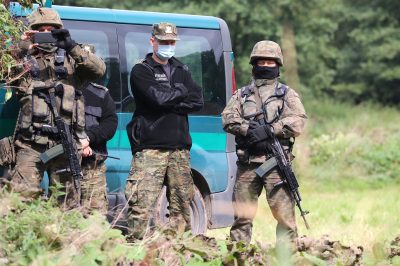
There have been two recent Supreme Court rulings that are relevant to the protection of human rights: the Supreme Court's decision of 10 August 2022 in the case II Ko 63/22 and the Supreme Court's decision of 30 May 2023 in the case III KK 265/21. The two cases before the Supreme Court concerned the admissibility of extradition of foreign nationals (a citizen of Russia and a citizen of Belarus), at the request of the law enforcement authorities of these countries. In analysing the situation in these countries, especially after the outbreak of Russia's full-scale invasion of Ukraine, the Supreme Court found that there is no guarantee that the fundamental human rights of people transferred to these countries would be respected.
In both cases, the Supreme Court referred to reports and opinions of HFHR experts in which they examined the human rights situation in the Russian Federation and the Republic of Belarus. The expert reports presented evidence of, among other things, the long-standing systemic problems with the mistreatment of detainees and impunity for officials, as well as the lack of an independent judiciary in Belarus. The Supreme Court also recognized the HFHR's arguments on the consequences of the Russian Federation's withdrawal from the Council of Europe, including the fact that it is not bound by the provisions of European Convention on Human Rights (ECHR). Relying on the principle of rebus sic stantibus, the Supreme Court reopened the closed extradition proceedings against the Russian citizen and overturned the decision of the Administrative Court on the admissibility of the transfer of the foreigner to this country. The Supreme Court's decisions should have an impact on the practice of administrative bodies in transferring foreigners to Russia and Belarus.
The situation in Russia
In the judgment II Ko 63/22, the Supreme Court referred primarily to the Russian Federation's loss of membership in the Council of Europe. In Resolution CM/Res(2022)2 adopted by the Committee of Ministers of the Council of Europe on 16 March 2022 the attack on Ukraine was considered to be a serious violation of Russia’s obligations under Article 3 of the Statute of the Council of Europe, according to which every member of the Council of Europe should recognise the principle of the rule of law and the principle that all persons under its jurisdiction enjoy human rights and fundamental freedoms. Pursuant to the adopted Resolution as of 16 October 2022 Russia is no longer a party to the ECHR.
The Supreme Court concluded that the human rights situation, which was already bad, worsened after 24 February 2022. Due to the lack of an independent judiciary, the systematic violation of the right to defence, the mistreatment of detainees and abusive recourse to the Interpol system, extradition requests by the Russian authorities should be treated with extreme caution. The termination of Russia's membership in the Council of Europe and the ECHR has led to a significant weakening of procedural safeguards for persons transferred to Russia. The SC recalled that Russia, as a non-party to the ECHR, is not currently bound by the prohibition of the death penalty, and guarantees under the prohibition of torture may be weakened.
Moreover, reports by independent organisations and the position of the Council of Europe show that Russia uses international law enforcement instruments for political purposes as repression against certain individuals outside its territory. The Supreme Court considered a particularly vulnerable group to be the one to which the foreigner at issue in the case belonged – Russian citizens of Chechen nationality who took part in the fighting against the Russian Federation on the territory of Syria and fought on the side of the so-called "Islamic State". According to the Supreme Court, the involvement of Russian citizens in fighting against their own country may exacerbate their fears about how they will be treated if they are transferred to the country. In this regard, the Supreme Court referred to a recent judgment of the European Court of Human Rights (ECtHR) concerning the surrender to Russia of a Chechen who was on French territory in connection with his terrorist activities (K.I. v. France, no. 5560/19). The Court found that the applicant's deportation to Russia would violate Article 3 of the ECHR.
This does not mean, however, that participation in terrorist groups should go unpunished. As the Supreme Court pointed out, in such a situation, Polish law enforcement authorities have an international obligation to conduct criminal proceedings and possibly bring the perpetrators of terrorist acts to justice. This obligation arises, inter alia, from the 1977 Convention on the Suppression of Terrorism (Journal of Laws of 1996, No. 117, items 557 and 558) which requires the country of residence of a foreign national suspected of terrorism to immediately refer the matter to the law enforcement authorities if the foreign national’s surrender to his or her country of origin is refused.
Situation in Belarus
In the case III KK 265/21, examined following a cassation appeal by the Ombudsman, the Supreme Court assessed the situation in Belarus and found that there is currently no guarantee of respect for the fundamental rights of persons transferred to that country. In this context, the Supreme Court referred, inter alia, to the opinion of the Eastern Department of the Ministry of Foreign Affairs, which stated that the judicial authorities in the Republic of Belarus do not fulfil the characteristics of an impartial court within the meaning of Article 6 (1) ECHR. Since respect for the right to judicial review of a deprivation of liberty is a fundamental principle of a country ruled by law, extradition to a country that does not respect this principle is unacceptable.
The Supreme Court also referred to the Polish authorities' position that Belarus is currently waging a hybrid war against Poland, as well as Belarus' involvement in Russia's aggression against Ukraine. In these circumstances, according to the Supreme Court, any forced expulsion of a foreign national from Polish territory to Belarus is unacceptable both in extradition proceedings and on the basis of the concluded international mutual legal assistance agreements. Surrender of such a person to a country where respect for fundamental human rights is not guaranteed and which, moreover, is treated by the authorities of the Republic of Poland as a hostile state complicit in a crime of aggression, would constitute a gross violation of those fundamental rights and constitutional freedoms, irrespective of the procedure in which the transfer of a particular person would take place.
Importantly, the Supreme Court has ruled that Belarus is not a safe country not only for its own citizens and Polish nationals travelling to that country, but also for foreigners staying there. According to the Supreme Court, this is proven by reports confirming the brutal treatment of migrants at the Polish-Belarusian border by the authorities of that country. The ill-treatment of persons by Belarusian border services amounts to inhuman or degrading treatment and in some cases can be considered torture, which is a violation of Belarus' international legal obligations. The Supreme Court also referred to the rulings of the administrative courts which, in the proceedings conducted so far, annulled the decisions of the Border Guard ordering the departure from the territory of the Republic of Poland of foreigners apprehended after irregularly crossing the border from Belarus to Poland.
Effects of the Supreme Court's decisions
In both cases, the Supreme Court declared the extradition of the Russian and Belarusian citizens to their country of origin legally inadmissible. Although the decisions were made in individual cases, they contain many indications of how other cases weighing the issue of the transfer of foreigners to these countries should now be treated. The Supreme Court's decisions are particularly topical in view of the systematically emerging extradition cases to Russia and Belarus, the forced returns to these countries that continue to be carried out, and the decisions issued by the Border Guard on the departure of foreign nationals who have crossed the Polish-Belarusian border in an irregular manner. In II Ko 63/22, the Supreme Court warned that the transfer of a foreign national to a state that does not provide guarantees of respect for fundamental human rights may lead to successful claims before the ECtHR. Moreover, the change in the situation after 24 February 2022, in particular the loss of Russia's membership in the Council of Europe and Belarus' involvement in Russia's aggression against Ukraine, may be grounds for reopening proceedings that have already been concluded.
HFHR report on the situation in the Russian Federation [Polish only]
HFHR report on the situation on the Polish-Belarusian border
Marta Górczyńska - Head of the Migration Department at the Helsinki Foundation for Human Rights, and a PhD candidate at the University of Warsaw. She specialises in the protection of the rights of migrants, strategic litigation and monitoring of human rights at borders. She has authored legal reports for UNHCR, the EU Agency for Fundamental Rights and other international institutions as well as publications on refugee and migration issues. She delivers workshops and training sessions on human rights protection.


